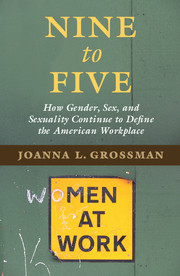Book contents
- Frontmatter
- Dedication
- Contents
- Foreword
- Acknowledgments
- Introduction
- PART I WHAT IS SEX DISCRIMINATION?
- 1 Sexual Jealousy
- 2 Too Hot to Be a Dental Hygienist?
- 3 A Twist on the Problem of Sex Inequality in Coaching
- 4 Mixed Motives
- 5 Sex Stereotyping and Dress Codes
- 6 A Victory for Transgender Employees
- 7 How Fast Must Female Transit Officers Run?
- 8 Who Is Protected by Antidiscrimination Laws?
- 9 Punishing the Coach Who Stood Up for His Female Athletes
- 10 Broader Protection against Workplace Retaliation
- 11 The Supreme Court Protects Retaliation Victims but Still Leaves Gaps in the Law
- PART II SEXUAL HARASSMENT
- PART III PREGNANT WOMEN AND MOTHERS AT WORK
- PART IV FEMALE BREADWINNERS AND THE GLASS CEILING
- Conclusion
- Notes
- Index
10 - Broader Protection against Workplace Retaliation
from PART I - WHAT IS SEX DISCRIMINATION?
Published online by Cambridge University Press: 05 May 2016
- Frontmatter
- Dedication
- Contents
- Foreword
- Acknowledgments
- Introduction
- PART I WHAT IS SEX DISCRIMINATION?
- 1 Sexual Jealousy
- 2 Too Hot to Be a Dental Hygienist?
- 3 A Twist on the Problem of Sex Inequality in Coaching
- 4 Mixed Motives
- 5 Sex Stereotyping and Dress Codes
- 6 A Victory for Transgender Employees
- 7 How Fast Must Female Transit Officers Run?
- 8 Who Is Protected by Antidiscrimination Laws?
- 9 Punishing the Coach Who Stood Up for His Female Athletes
- 10 Broader Protection against Workplace Retaliation
- 11 The Supreme Court Protects Retaliation Victims but Still Leaves Gaps in the Law
- PART II SEXUAL HARASSMENT
- PART III PREGNANT WOMEN AND MOTHERS AT WORK
- PART IV FEMALE BREADWINNERS AND THE GLASS CEILING
- Conclusion
- Notes
- Index
Summary
On June 22, 2006, the Supreme Court issued an important decision interpreting Title VII of the Civil Rights Act of 1964. Title VII not only bans discrimination on the basis of protected characteristics like race and sex but also expressly prohibits retaliation against those who assert their rights against discrimination. The two main questions for the Court in Burlington Northern & Santa Fe Railway Co. v. White were the following: Must a retaliatory act be work related in order to violate Title VII? And when is retaliation serious enough to be actionable?
The Supreme Court, in a majority opinion authored by Justice Breyer and joined by all but one justice, answered these questions with a new test that has the potential to provide employees with robust protection against retaliation. (Justice Alito concurred in the judgment but refused to join the opinion because he felt the newly adopted test was too broad.) Whether the test's potential is realized, however, will depend on whether lower courts, in applying it, take into account the ways in which employees experience retaliation at work, and the lengths to which employees will go to avoid such consequences.
SHEILA WHITE: A WOMAN IN A MAN'S WORLD
Here are the facts of the case that came before the Court: Sheila White, a woman with experience operating forklifts, applied for a job in the Maintenance of Way department of Burlington Northern & Santa Fe Railway Company. The roadmaster, Marvin Brown, hired White as a track laborer, a job that included everything from removing litter to replacing track components. Soon after White was hired, a more skilled, more desirable position – operating the forklift – became available. Brown immediately assigned her to it.
White's immediate supervisor, Bill Joiner, however, told her women should not be working in the Maintenance of Way department. She complained, and he was suspended for that, for other insults, and inappropriate remarks directed at White. The suspension made sense, for his hostile behavior was of the type that can contribute to an unlawful, sex-based hostile environment, which violates Title VII.
According to the jury's findings, White suffered retaliation for complaining about Joiner's behavior: she was removed from forklift duty and restricted to track laborer tasks.
- Type
- Chapter
- Information
- Nine to FiveHow Gender, Sex, and Sexuality Continue to Define the American Workplace, pp. 58 - 63Publisher: Cambridge University PressPrint publication year: 2016



